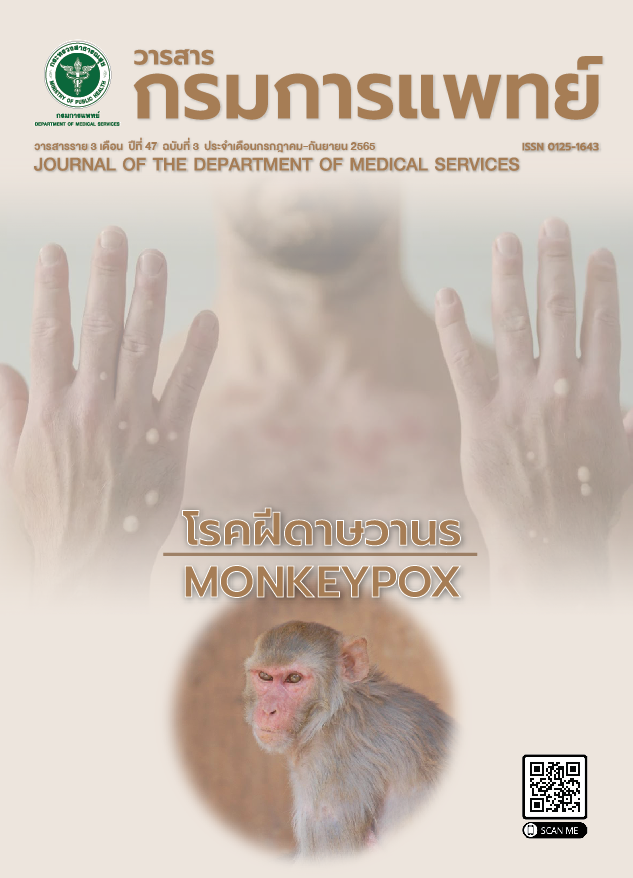Effectiveness and Safety Evaluation of Medical Cannabis in Alzheimer’s disease in Chiang Mai Neurological Hospital
Keywords:
Medical Cannabis, Alzheimer patient, SafetyAbstract
Background: Alzheimer’s disease (AD) is a common chronic disease in the elderly caused by degeneration of a nervous system of thought, intelligence and behavior. The efficacy of pharmacological treatment options is limited. Objective: This study aimed to evaluate efficacy and safety of medical cannabis extract as a part of treatment for patients with Alzheimer’s disease. Methods: This study was conducted as an open label study comparing pre and post-treatment with medical cannabis in 9 patients with Alzheimer’s disease. The collected parameters were Thai-mental state examination (TMSE), Montreal Cognitive Assessment (MoCA), adverse event evaluation, emotional and behavioral assessments, Barthel activity daily living (ADL) Index and quality of life (QOL). Result: Most of the samples were female (77.8%), mean age 71 years, and average duration of disease was 2 years. All patients received 1 drop of cannabis (THC:CBD=1:1) sublingually before bed time. The addition of medical cannabis to patients’ disease regimen was associated with significant decrease in depression scale (p <0.05). A report adverse event was dizziness (11%). Conclusion: The administration of medical cannabis in this study was safe and tended to reduce depression in patients with Alzheimer’s disease.
References
Phunthumchinda K, Bunnag S. Dementia: aging or disease?. Bangkok: Khobfai Publishers 2000.
Prasat Neurological Institute. Clinical practice guidelines: Dementia. Bangkok: Prasat Neurological Institute, Department of Medical Science 2010.
World Health Organization. Dementia: a public health priority. United Kingdom: WHO; 2012.
Alzheimer’s Association. 2010 Alzheimer’s disease facts and figures. Alzheimers Dement 2010; 6:158-94.
Mayo clinic. Alzheimer's stages: How the disease progresses. [Internet] 2004 [cited 2019 Juy 13]. Available from:https://www.mayoclinic.org/diseases-conditions/alzheimers-disease/in-depth/alzheimers-stages/art-20048448
Boonwang S. Background behavior among the elderly with alzhemer’s disease. Journal of Community Development Research 2011; 4:118-28.
Department of Medical Health. Cannabis and dementia: benefit or harm? [Internet] 2019 [cited 2019 Nov 13]. Available from:https://www.dmh.go.th/news-dmh/view.asp?id=29755
Santibanez RA, Sepehry AA, Robin Hsiung G-Y. Cannabis and alzheimer’s disease: a systematic review of the evidence. Alzheimer’s & Dementia [Internet]. 2017 [cited 2019 Jul 9]. Available from:https://alzjournals.onlinelibrary.wiley.com/doi/epdf/10.1016/j.jalz.2017.06.674
Liu CS, Chau SA, Ruthirakuhan M, Lanctôt KL, Herrmann N. Cannabinoids for the treatment of agitation and aggression in alzheimer's disease. CNS Drugs 2015; 29: 615-23.
Shelef A, Barak Y, Berger U, Paleacu D, Tadger S, Plopsky I, Baruch Y. Safety and efficacy of medical cannabis oil for behavioral and psychological symptoms of dementia: an-open label, add-on, pilot study. J Alzheimers Dis 2016; 51: 15-9.
Lim K, See YM, Lee J. A systematic review of the effectiveness of medical cannabis for psychiatric, movement and neurodegenerative disorders. Clin Psychopharmacol Neurosci 2017; 15: 301.
Volicer L, Stelly M, Morris J, McLaughlin J, Volicer BJ. Effects of dronabinol on anorexia and disturbed behavior in patients with alzheimer's disease. Int J Geriatr Psychiatry 1997; 12: 913-9.
Woodward MR, Harper DG, Stolyar A, Forester BP, Ellison JM. Dronabinol for the treatment of agitation and aggressive behavior in acutely hospitalized severely demented patients with noncognitive behavioral symptoms. Am J Geriatr Psychiatry 2014; 22: 415-9.
van den Elsen GA, Ahmed AI, Verkes RJ, Kramers C, Feuth T, Rosenberg PB, van der Marck MA, Rikkert MG. Tetrahydrocannabinol for neuropsychiatric symptoms in dementia: a randomized controlled trial. Neurology 2015; 84: 2338-46.
Leelarasamee A, Srisubat A, Srisukho C, Wongsirisuwan M, editors. Guidance on Cannabis for medicaluse. Bangkok: Medical Council; 2019.
Department of Medical Service. Guidance on Cannabis for Medical Use. [Internet]. 2021 [cited 2020 Jan 31]. Available from:https://mnfda.fda.moph.go.th/narcotic/wp-content/uploads/2021/04/Guidance-Updated-v-update-V.4260464.pdf
Downloads
Published
How to Cite
Issue
Section
License
Copyright (c) 2022 Department of Medical Services, Ministry of Public Health

This work is licensed under a Creative Commons Attribution-NonCommercial-NoDerivatives 4.0 International License.
บทความที่ได้รับการตีพิมพ์เป็นลิขสิทธิ์ของกรมการแพทย์ กระทรวงสาธารณสุข
ข้อความและข้อคิดเห็นต่างๆ เป็นของผู้เขียนบทความ ไม่ใช่ความเห็นของกองบรรณาธิการหรือของวารสารกรมการแพทย์



